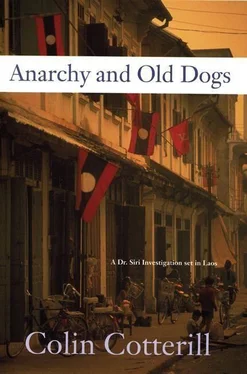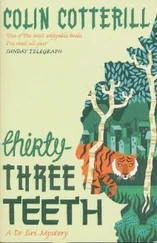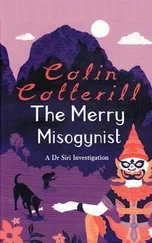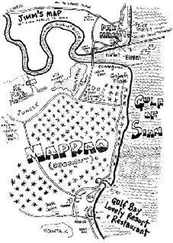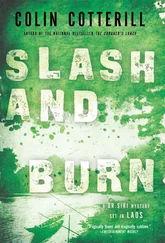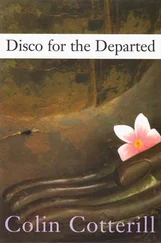Colin Cotterill - Anarchy and the Old Dogs
Здесь есть возможность читать онлайн «Colin Cotterill - Anarchy and the Old Dogs» весь текст электронной книги совершенно бесплатно (целиком полную версию без сокращений). В некоторых случаях можно слушать аудио, скачать через торрент в формате fb2 и присутствует краткое содержание. Жанр: Криминальный детектив, на английском языке. Описание произведения, (предисловие) а так же отзывы посетителей доступны на портале библиотеки ЛибКат.
- Название:Anarchy and the Old Dogs
- Автор:
- Жанр:
- Год:неизвестен
- ISBN:нет данных
- Рейтинг книги:3 / 5. Голосов: 1
-
Избранное:Добавить в избранное
- Отзывы:
-
Ваша оценка:
- 60
- 1
- 2
- 3
- 4
- 5
Anarchy and the Old Dogs: краткое содержание, описание и аннотация
Предлагаем к чтению аннотацию, описание, краткое содержание или предисловие (зависит от того, что написал сам автор книги «Anarchy and the Old Dogs»). Если вы не нашли необходимую информацию о книге — напишите в комментариях, мы постараемся отыскать её.
Anarchy and the Old Dogs — читать онлайн бесплатно полную книгу (весь текст) целиком
Ниже представлен текст книги, разбитый по страницам. Система сохранения места последней прочитанной страницы, позволяет с удобством читать онлайн бесплатно книгу «Anarchy and the Old Dogs», без необходимости каждый раз заново искать на чём Вы остановились. Поставьте закладку, и сможете в любой момент перейти на страницу, на которой закончили чтение.
Интервал:
Закладка:
“He had an eye for you, as I recall.”
“Didn’t they all? All but one, I mean.” Siri felt her glancing at him but didn’t look up from the title page that described the camp and its purpose. “And, to my surprise,” she continued, “he kept his word. It wasn’t the fastest-kept word in history but about fifteen years ago I had a visitor.”
“The skinny boy.”
“Had become a skinny middle-aged man. He’d moved to France, married, et cetera, et cetera. But when he decided to come back to Laos he made this set of prints for me. He found me, and here they are.”
“I hope you thanked him properly.”
“Least I could do, considering what he’d brought me. It was the loveliest gift a girl could get.”
She flipped open to the first set of pictures and Siri’s mind turned eleven spinning somersaults into the page. He was back in 1940. There he was standing with his class, B5, all eighteen-year-olds in their group photo, everyone taller than Dr. Siri, everyone as happy as lizards in an ant storm. There he was in front of a blackboard, his raven black hair invisible against the black paint, his trim-waisted shirt a little too tight, highlighting his muscles. There he was at a campfire, lit by the light of the flames, deep in discussion, eyes burning with passion.
“Heavens,” he said. “I was adorable.”
“No argument there,” Daeng agreed.
He turned another page. There he was, there they were: Siri and Boua sitting at a foldable table discussing the curriculum. Him smiling; her serious, young, beautiful-alive. His pulse raced just looking at her.
“You were quite a couple.”
Siri couldn’t bring himself to turn the page. “We used to have pictures,” he said. “Some from France, some from Hanoi, posed, studio pictures mostly. But they were either lost or destroyed by the elements. This is the first picture I’ve seen of her for… I don’t know, twenty years.”
“You loved her. We could all tell.”
“Still do.”
Daeng looked into his green eyes and smiled. “There are more of the two of you in there.”
Siri went through the photographs one by one, naming the youths, remembering exactly what activities they’d done on that particular day. But while he was studying them, he noticed something as clearly as if it had been written in headlines above each picture: enthusiasm. The kids looked at their teachers as if they could see halos. They were eating up everything. And these weren’t the posed photos the PL set up for propaganda. This was the real thing. These boys and girls were pumped up with national pride. Looking at them made him understand why he’d hesitated to condemn Civilai.
“They look like they’re happy to be there,” he said.
“We all were. Two important teachers trained in France, and a qualified doctor and nurse no less. You could have both been off somewhere making a lot of money, but instead you gave up two years to work with poor kids. What did they pay you? Two francs a month?”
“I believe there was a fifty-centime Christmas bonus.” They laughed.
“Of course they were happy to be there,” Daeng said. “They idolized you both. You were heroes to us. We all loved you.”
And that was something else Siri had noticed in the black-and-white pictures. The attractive cook attending classes, helping at meetings. No, not attractive-beautiful. At the time he’d hardly noticed her. It certainly hadn’t occurred to him how lovely she was. An old Lao poet had once written that love was a sharpened spear that gouged out a man’s eyes. That had obviously been the case with Boua. He’d never noticed other women, didn’t once consider being with anyone else. He’d never observed Daeng’s adoring stares, her constant presence. He saw them now.
“You weren’t ugly yourself,” he said.
“At last, a compliment. Well worth the wait.”
They laughed again and Siri closed the album and rested his hands on the back cover.
“That was marvelous, truly marvelous,” he said. “You wouldn’t know how much I needed that. Or, yes, perhaps you would. Thank you so much for letting me see it.”
“Oh, I didn’t bring it just to show you,” she said. “It’s a gift.”
“No.”
“Yes.”
“I could never expect you to part with such a precious thing.”
“Siri, I think over the past couple of weeks, you’ve lost yourself. I want you to have this so if it ever happens again you just have to look at the faces of your students.”
He leaned over and kissed her on the cheek and this time she didn’t pull back.
Dtui Puts on Weight
It was September. A good deal had happened in the People’s Democratic Republic of Laos but nothing had changed. Perhaps it was because news is only news if it comes to fruition. A THOUSAND PEOPLE NOT KILLED IN AN EARTHQUAKE is hardly a headline you’d expect to see in a national newspaper. The failed coup was news that didn’t materialize. The Party decided to keep it to themselves and not trouble the population with it. The people had enough problems of their own. Pasason Lao newspaper saw fit not to mention an ex-minister’s being arrested and sent to seminar, or one or two generals transferred to posts that didn’t exist. In the hands of the Lao Department of Information, something like the Second World War could have ended up as a slight fracas.
The resignation of a senior member of the politburo due to ill health, on the other hand, warranted a full page. It mentioned Civilai Songsawat’s devotion to the Party and his long career of faithful service. In the accompanying photograph he looked full of enthusiasm and vim. It was thirty years old. As few people bothered to read the Pasason Lao, Civilai’s departure, like the August coup attempt, passed unnoticed like fireflies in the midday sun.
At the Mahosot morgue, for the first two weeks, the same could be said. A lot had happened but nothing had changed. Mr. Geung, the morgue assistant who wore his Down syndrome like a fashion statement, was out of the hospital and back at work. He’d laughed at all Dtui’s stories of their exploits in Thailand and understood no more than half of them, but it didn’t matter.
Dr. Siri had betrayed his country but only two people knew that-three if he included the fortune-teller. The shadow behind the wicked man was equally guilty. He’d failed to expose a traitor, settling instead for a compromise. Civilai would leave public office and grow vegetables on the land behind his small house in the old American compound. Being away from his beloved politburo would be punishment enough. Neither of them would talk of the events of the Ubon coup. Siri, after much soul-searching and river watching, decided that he could live with that level of treachery, and got on with his life. Dtui ate, Judge Haeng grumbled, Crazy Rajid walked naked in circles around Nam Poo Fountain. Everything had apparently reverted to the way it was before the blind dentist walked under a Chinese logging truck. But then a day arrived when everything turned upside down.
Siri was in his office, trying in a report to explain an aneurysm of the splenic artery in a way that Judge Haeng might understand. He was referring to Chairman Mao’s Little Red Book for suitable similes when a most unexpected guest walked into the room. Dtui and Geung and Siri all looked up from their desks when Daeng appeared in the doorway.
“Sorry,” she said. “There wasn’t a front doorbell so I thought I should just come in.” Siri walked over to her with a big smile on his face.
“Well, well,” he said. “Apart from Dr. Kissinger, you’re the last person I expected to find standing in my morgue.”
“You know how I am, Siri. I had this impulse, and once I get an idea in my head…”
Читать дальшеИнтервал:
Закладка:
Похожие книги на «Anarchy and the Old Dogs»
Представляем Вашему вниманию похожие книги на «Anarchy and the Old Dogs» списком для выбора. Мы отобрали схожую по названию и смыслу литературу в надежде предоставить читателям больше вариантов отыскать новые, интересные, ещё непрочитанные произведения.
Обсуждение, отзывы о книге «Anarchy and the Old Dogs» и просто собственные мнения читателей. Оставьте ваши комментарии, напишите, что Вы думаете о произведении, его смысле или главных героях. Укажите что конкретно понравилось, а что нет, и почему Вы так считаете.
